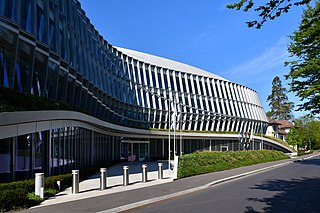
The International Olympic Committee is a non-governmental sports organization based in Lausanne, Switzerland.

The modern Olympic Games are the leading international sporting events featuring summer and winter sports competitions in which thousands of athletes from around the world participate in a variety of competitions. The Olympic Games are considered the world's foremost sports competition with more than 200 teams, representing sovereign states and territories, participating. By default, the Games generally substitute for any world championships during the year in which they take place. The Olympic Games are held every four years. Since 1994, they have alternated between the Summer and Winter Olympics every two years during the four-year Olympiad.
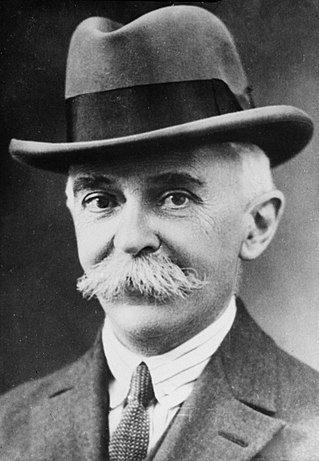
Charles Pierre de Frédy, Baron de Coubertin, also known as Pierre de Coubertin and Baron de Coubertin, was a French educator and historian, co-founder of the International Olympic Committee, and its second president. He is known as the father of the modern Olympic Games. He was particularly active in promoting the introduction of sport in French schools.

The Summer Olympic Games, also known as the Games of the Olympiad, is a major international multi-sport event normally held once every four years. The inaugural Games took place in 1896 in Athens, Greece, and the current Games are being held in 2024 in Paris, France. This was the first international multi-sport event of its kind, organized by the International Olympic Committee (IOC) founded by Pierre de Coubertin. The tradition of awarding medals began in 1904; in each Olympic event, gold medals are awarded for first place, silver medals for second place, and bronze medals for third place. The Winter Olympic Games were created out of the success of the Summer Olympic Games, which are regarded as the largest and most prestigious multi-sport international event in the world.

The 1896 Summer Olympics, officially known as the Games of the I Olympiad and commonly known as Athens 1896, were the first international Olympic Games held in modern history. Organised by the International Olympic Committee (IOC), which had been created by French aristocrat Pierre de Coubertin, the event was held in Athens, Greece, from 6 to 15 April 1896.

At the 1896 Summer Olympics, the first modern Olympiad, twelve athletics events were contested. A total of 25 medals were awarded. The medals were later denoted as 37 modern medals. All of the events except the marathon were held in the Panathinaiko Stadium, which was also the finish for the marathon. Events were held on 6 April, 7 April, 9 April, and 10 April 1896. Altogether, 63 athletes, all men, from nine nations competed. This made athletics the most international of the nine sports at the 1896 Games.

The 2004 Summer Olympics, officially the Games of the XXVIII Olympiad and officially branded as Athens 2004, were an international multi-sport event held from 13 to 29 August 2004 in Athens, Greece. The Games saw 10,625 athletes compete, some 600 more than expected, accompanied by 5,501 team officials from 201 countries, with 301 medal events in 28 different sports. The 2004 Games marked the first time since the 1996 Summer Olympics that all countries with a National Olympic Committee were in attendance, and also marked the first time Athens hosted the Games since their first modern incarnation in 1896 as well as the return of the Olympic games to its birthplace. Athens became one of only four cities at the time to have hosted the Summer Olympic Games on two occasions. A new medal obverse was introduced at these Games, replacing the design by Giuseppe Cassioli that had been used since 1928. The new design features the Panathenaic Stadium in Athens rectifying the long-running mistake of using a depiction of the Roman Colosseum rather than a Greek venue. The 2004 Games was the first of two consecutive Olympic games to be held in Southern Europe since the 1992 Summer Olympics in Barcelona, Spain, and was followed by the 2006 Winter Olympics in Turin, Italy.
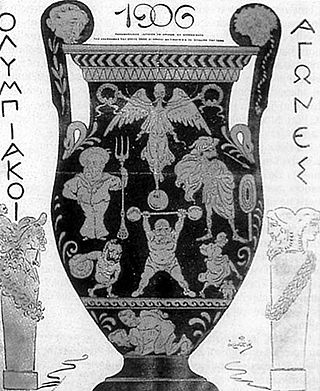
The 1906 Intercalated Games or 1906 Olympic Games was an international multi-sport event that was celebrated in Athens, Greece. They were at the time considered to be Olympic Games and were referred to as the "Second International Olympic Games in Athens" by the International Olympic Committee. However, the medals that were distributed to the participants during these games were later determined not to be officially recognised by the Olympic Committee and are not displayed with the collection of Olympic medals at the Olympic Museum in Lausanne, Switzerland.

The 1900 Summer Olympics, today officially known as the Games of the II Olympiad and also known as Paris 1900, were an international multi-sport event that took place in Paris, France, from 14 May to 28 October 1900. No opening or closing ceremonies were held.

Avery Brundage was the fifth president of the International Olympic Committee, serving from 1952 to 1972, the only American and only non-European to attain that position. Brundage is remembered as a zealous advocate of amateurism and for his involvement with the 1936 and 1972 Summer Olympics, both held in Germany.

Carl Diem was a German sports administrator, and as Secretary General of the Organizing Committee of the Berlin Olympic Games, the chief organizer of the 1936 Olympic Summer Games.

The International Olympic Committee (IOC) uses icons, flags, and symbols to elevate the Olympic Games. These symbols include those commonly used during Olympic competitions such as the flame, fanfare, and theme and those used throughout the years, such as the Olympic flag.

The Indian Olympic Association (IOA) or Indian Olympic Committee (IOC) is responsible for selecting athletes to represent India at the Olympic Games, Asian Games and other international sports competitions, and managing Indian teams at these events. It goes with the name of Team India. It also acts as the Indian Commonwealth Games Association, responsible for selecting athletes to represent India at the Commonwealth Games.
Stamata Revithi was a Greek woman who ran the 40-kilometre marathon during the 1896 Summer Olympics. The Games excluded women from competition, but Revithi insisted that she be allowed to run. Revithi ran one day after the men had completed the official race, and although she finished the marathon in approximately 5 hours and 30 minutes and found witnesses to sign their names and verify the running time, she was not allowed to enter the Panathinaiko Stadium at the end of the race. She intended to present her documentation to the Hellenic Olympic Committee in the hopes that they would recognize her achievement, but it is not known whether she did so. No known record survives of Revithi's life after her run.

The men's marathon event was a special race invented as part of the Athletics at the 1896 Summer Olympics programme. Seventeen athletes from 5 nations competed. It was the capstone of the athletics programme. The event was won by Spyridon Louis and was the only Greek victory in athletics.
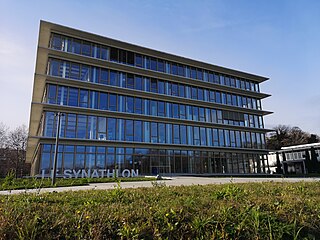
The International Academy of Sport Science and Technology is a non-profit foundation based in Lausanne, Switzerland.
Athens 2010 Youth Olympics Bid is the official bid of Athens in order to host the first Youth Olympics. The Athens bid is one of the strong favourites as the Ancient Olympics started here, the Modern Olympics did as well. Athens was the host of the 1896 Summer Olympics the 2004 Summer Olympics and seven IOC Sessions. As stated on their website, Athens is eager to host the Games not only to utilize their state of the art venues, but to establish the Youth Olympics in the "birthplace" of the Modern and Ancient Games.

The Hellenic Olympic Committee is the governing Olympic body of Greece. It is the second oldest National Olympic Committee in the world, it organizes the country's representatives at the Olympic Games and other multi-sport events.

The Zappas Olympics, simply called Olympics at the time, were a series of athletic events held in Athens, Greece, in 1859, 1870 and 1875, sponsored by Greek businessman Evangelis Zappas. These games were one of the first revivals of the ancient Olympic Games in the modern era. Their success provided further inspiration for William Penny Brookes in England, whose games had been running since 1850, and the International Olympic Committee series from 1896.
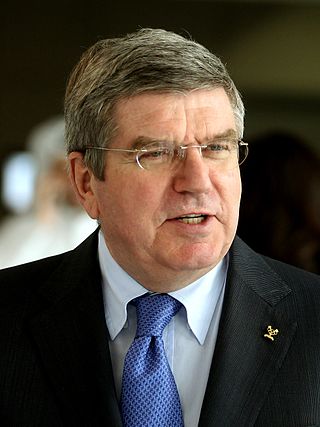
The president of the International Olympic Committee is head of the executive board that assumes the general overall responsibility for the administration of the International Olympic Committee (IOC) and the management of its affairs. The IOC Executive Board consists of the president, four vice-presidents, and ten other IOC members; all of the board members are elected by the IOC Session, using a secret ballot, by a majority vote.















